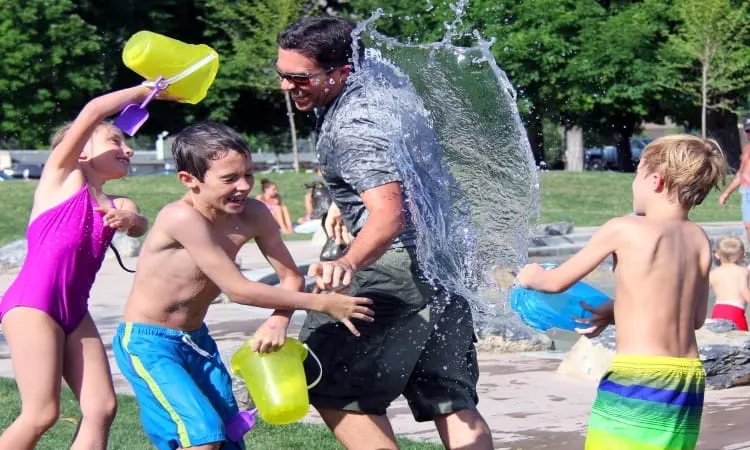
Simply put, kids need playtime. Kids are full of energy and need to participate in playtime to release it all.
Many families fill their kids’ schedules with routines, school, practices and responsibilities. Days may often fill up without any room for unstructured play. While it’s great to keep kids busy, they need a moment in the day to be kids.
All forms of play, whether inside or outside, help enrich your child’s development. Here are seven reasons kids need playtime in their day!
1. Keeps Them Healthy and Active
When kids are free to run around and play, they’re staying healthy and active. If your child is in school, they’re spending most of their waking hours sitting at a desk or now, sitting at home as they complete classes online. Plus, screens have taken away activity, and when kids are watching shows or playing games on a screen, they’re probably sitting.
Give your kids some unstructured, screen-free time to go outside and play. It can keep them at a healthy weight and help in developing their cardiovascular and immune systems. Provide them with a few outdoor toys, and do your best to leave them alone. As they play and run, they build their strength and have more endurance. When they come back inside, they’ll be tired and ready for bed!
2. Encourages Communication
Kids who play with other kids have to talk to one another at some point. Take your child to a park or invite one of your child’s friends over to play. Of course, ensure you’re practicing the guidelines and safety measures for COVID-19. Your child’s social skills improve as you give them more opportunities to play with other kids.
Additionally, your child might be able to learn new words from other children. They’ll hear new words, which builds vocabulary and language skills.
3. Fosters Creativity
Unstructured play allows children to do and be what they want. They don’t have any restrictions as to what kinds of games or activities they can play. Children have the time to truly explore their minds and get creative with what they have.
Perhaps they play dress-up with wacky outfits or have a tea party with their stuffed animals or even make a mud pie when they’re outside after a rainstorm. Without creativity, you wouldn’t have artists and story writers.
4. Builds Physical Development Skills
Kids who have the freedom to play build physical development skills. As your child grows, they’re going to learn how to walk, run, jump and bend their bodies in new ways. Play encourages those movements. When kids are allowed to run around a playground, they improve their coordination, flexibility, and balance.
All of these skills help lower their risk for injury. The better they can adapt to new obstacles, the less frequently they’ll fall or get hurt. Therefore, the more time you provide them to play, the fewer times they’ll get hurt in the future.
5. Teaches Critical Thinking Skills
As children play, they often run into obstacles or may not have the correct toy for what kind of play they’re doing. They’ll often problem-solve on their own and use another toy in place of what they needed. This is the start of critical thinking.
Additionally, children will play with others, whether at school, daycare, or even the park. They may have to take turns or wait to play with a toy, so they have to learn things like negotiation or conflict resolution. Kids make the rules in unstructured play, so they have to develop a plan on their own of how to deal with issues.
6. Relieves Stress
After a day of school and learning or a busy schedule, sometimes all kids want to do is play for a little while before bed. It could be playing outside, playing a game with the family, playing video games, or even doing arts and crafts. Whatever it is, you should give them that time.
Play is often a child’s way to relieve stress. If they go to bed every night without having had a chance to play, they may be bottling up their emotions and stress and need an outlet. Kids need playtime for their mental health just as much as they need it for their physical health.
7. Allows Kids to Explore Their Interests
Finally, giving kids more playtime allows them to explore their interests and passions. They get the chance to play with and do whatever interests them. Kids have the opportunity to do whatever they want with the time you provide them to play.
Let your kids experience doing many things, such as playing sports, learning an instrument, or even building robots and electronics. In the process of trying new things, they may discover their lifelong passion or gain a new skill that can be an interesting conversation starter in the future Take this gentle reminder for all parents: be careful not to push your kids to do something that they don’t want to do, and don’t live out your dreams through your children.
As they play with other kids, they may learn new interests as well. Perhaps their friend has an art kit or a bunch of sports equipment — your child might find something new that they love! Some of these interests they develop as kids may go well into adulthood, so give them time to play throughout the day.
Let Them Play!
Children have less playtime now than they used to. With busy schedules and screens, time for unstructured play has dwindled. Carve out time in your child’s day to let them play without restrictions. You’ll be amazed at how their mood improves and how they’re developing!
- Sagittarius Man & Gemini Woman Love and Sex Compatibility - January 31, 2024
- Taurus Ascendant Rising Personality Traits in Men (Guide) - January 31, 2024
- How to Seduce and Attract a Sagittarius Man (Seduction Tips) - January 31, 2024
